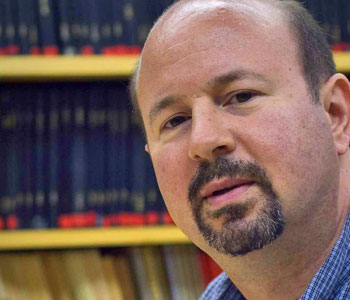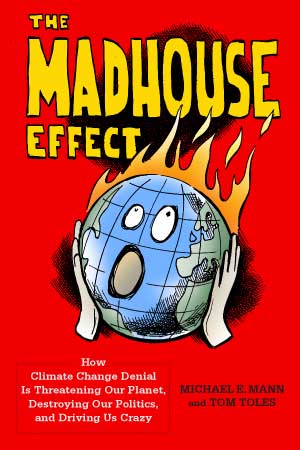
This book is about the single greatest challenge that we face as a civilization, the challenge to tackle the problem of human-caused climate change. It is about the ongoing campaign, by fossil fuel interests and those who do their bidding, to deny the reality and threat of climate change. It is about how we get out of this “Madhouse” in which find ourselves.
When we published the book in Fall 2016, prior to the latest presidential election, some of our colleagues criticized us about writing a book about climate change denial. Denial has become irrelevant, they said. Why give it oxygen by writing about it?
Sadly, climate denialism is very much back in vogue in Washington DC now. A climate change denying president has appointed climate change deniers to key positions in his nascent administration. If there was any question about it before, there is none anymore. We are very much back in the Madhouse.
We use brilliant, hard-hitting climate-themed cartoons by my co-author Tom Toles as the scaffolding for telling the story. The text unpacks, supports and expands on the message of the cartoons. This book has attitude.
In the book’s eight chapters we cover the basic philosophy of science, the science of climate change, climate change impacts, the campaign to deny climate change and the hypocrisy associated with it, the dangers of so-called “geoengineering” techno-fixes to the problem, and finally, the path forward toward actually solving the problem. Where appropriate, we name names and call out the bad actors. The book ends on a note of cautious optimism.
Where our book differs from past books about the climate change topic is that it uses humor, satire, and ridicule — rather than graphs and charts and science-speak — to assess the problem. By framing the issue in terms humor and satire, we hope to reach folks who haven’t otherwise yet been engaged by the issue.
Denial is something we encounter in many aspects of modern life, and there is an entire psychological literature dealing with the topic. In this book, we are focused on a particular type of denial — the denial of the threat we face from human-caused climate change.
While this denial has features in common with other forms of denial, there is also something unique in this case. Fossil fuel interests have spent millions of dollars funding a disinformation campaign aimed at confusing the public and policymakers about the scientific evidence for human-caused climate change.
As a result, the public is substantially misinformed and confused about the degree of scientific consensus behind human-caused climate change.
While there is nearly unanimous acceptance by scientists that climate change is real and human-caused (97-99% depending on the assessment), most public polling reveals that only a bare majority of the public accepts the consensus scientific viewpoint.
A non-trivial 15-20% subset of the population actively attacks the science of climate change and is committed to promoting the idea that climate change is a massive hoax. This notion is fed by conservative groups, right wing media outlets, and fossil fuel interests. Such is the “Madhouse” that we describe, criticize, and ridicule in The Madhouse Effect.
The Madhouse Effect is, by design, a book that readers can just pick up, skim through, and find a page that both engages and informs.
If a reader were to browse only a few pages, my co-author Tom and I might want them to check out the preface. It’s entitled “Why We Wrote This Book.” It provides with a sense of how it is that a climate scientist and an editorial cartoonist would come to collaborate as we did. It conveys the tremendous urgency of acting to avert catastrophic climate change.
The closing pages of the book could also be a very good entry point. Here we give the reason for cautious optimism, despite the many challenges that we currently face when it comes to climate action.
The Madhouse Effect has newfound prescience. Unforeseen when it was first published in early Fall 2016 is the relevance that the phenomenon of climate change denial now has, after the November 2016 U.S. presidential election.
To the extent we might have seemed to have escaped it, we now find ourselves very much back in the madhouse of climate change denial. If previously the clock has been ticking, depending on the new administration’s actions, we may be facing a clock that could run out. That makes the challenge of acting to avert catastrophic climate change even greater now than it was before.
That, in turn, makes it even more important that individuals engage in the actions that we motivate in the final chapter of The Madhouse Effect — grassroots efforts to mobilize public concern and support for action, putting pressure on our elected representatives, and encouraging international cooperation.
There is still reason for cautious optimism given the progress both in the U.S. and abroad in moving away from fossil fuels. We have seen policy progress at the international level — the 2015 Paris agreement and the commitment to build on it.
While Trump and climate-change denying republicans might deal a temporary setback, they cannot ultimately stem the tide — the world has decided it is time to move beyond the antiquated age of fossil fuels. We will solve the problem. If anything, this message of The Madhouse Effect is even more salient now than it was when the book was published.


Michael E. Mann is Distinguished Professor of Atmospheric Science and Director of the Earth System Science Center at Penn State. He has authored more than 200 publications, including three books, Dire Predictions: Understanding Climate Change, and The Hockey Stick and the Climate Wars and The Madhouse Effect, featured in his two Rorotoko interviews. Mann was selected by Scientific American as one of the fifty leading visionaries in science and technology in 2002, was awarded the Hans Oeschger Medal of the EGU in 2012 and the National Conservation Achievement Award of the NWF in 2013. He made the Bloomberg News list of fifty most influential people in 2013. In 2014, he received the Friend of the Planet Award from NCSE. Michael E. Mann is a Fellow of the AGU, AMS, and the AAAS.